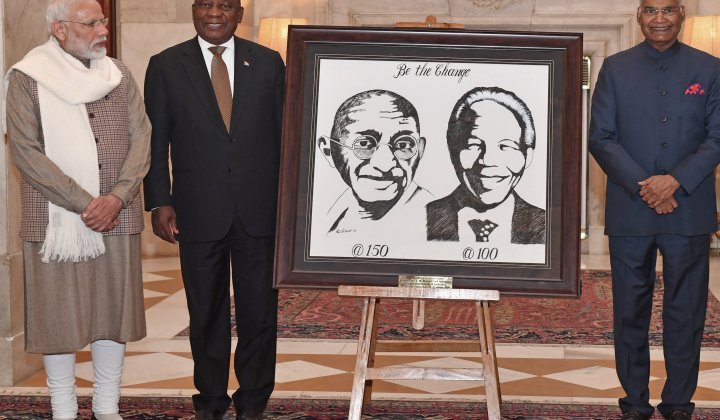In 2011, just months before his death, Jobs made the following comment: “… technology alone is not enough – it’s technology married with liberal arts, married with the humanities, that yields us the results that make our heart sing.”
More recently, Ma told a Bloomberg Global Business Forum: “If you want, in this world, to be successful you must have the IQ, EQ and LQ… the Q of love, which machines never have.” He continued this theme at the 2018 World Economic Forum in Davos when the Chinese e-commerce guru called for a new way of preparing youngsters for the world of work: “We cannot teach our kids to compete with machines, which are smarter. We have to teach something unique, [so] that machines cannot catch up with us.”
What both Ma and Jobs were highlighting is that technology, while all-absorbing, topical and essential to our modern way of life, is just an enabler. It is not a market disruptor. These two digital doyens appreciated that the human touch is critical to building sustainable competitive organisations.
Right now, however, we are caught up in a veritable frenzy of technology, lurching from one new disruptor to the next. Unfortunately, many people and organisations are getting so caught up in the hype of technology and the ensuing digital disruption that they fail to realise that we don’t build technology for other machines, we build technology and we digitise for human beings. We are in business for humans.
This might seem obvious but, instead, technology has become an easy way out for many organisations that lack the imagination and the drive to put people first. Often companies make the mistake of thinking that digital – and digital alone – makes the lives of customers easier. I passionately believe that companies should be taking the time to determine if the technology they are harnessing has relevance to the end user. If not, why bother? Using machine learning and artificial intelligence and digital for the sake of it does not enhance the customer experience on its own. For that you need people.
The human value
If you look beyond the tech-speak, you’ll find a wealth of sectors moving towards a more human-centric approach to doing business. Often the results are disruptive and game changing. Take, for example, Multichoice’s current battle against Netflix in South Africa. Multichoice’s DStv offering, for so long the standard bearer in South Africa (and Africa) for entertainment, is now under pressure from a choice-orientated, client-driven platform. I would suggest that Multichoice responds by getting even closer to their customers by harnessing human creativity and their local contextual knowledge and insight to find people-focused solutions.
Similarly, in the world of retail, Amazon has – and continues to – shake up the sector. Locally we’ve seen Stuttafords close and Edcon and Mr Price under pressure, while online continues to grow. Just recently Geraldine Mitchley, Senior Director of Strategic Partnerships and Emerging Payments at Visa Sub-Saharan Africa, told the DHL eCommerce Money Africa summit that eCommerce in South Africa amounted to about R10 billion in 2017, helped by a more connected customer and simpler and better online platforms. “Companies are eagerly implementing a variety of digital initiatives to transform the customer experience,” Fin24 quoted Mitchley as saying.
If you want an example of where this transformative, human focus will take us, look no further than Amazon in the US. Amazon grew 1,934% in terms of its market cap between 2006 and 2016. It went from being a US$17 billion company into a US$355 billion company. It is now set to be the next exclusive member of the trillion dollar club. Why? Because Amazon understood the changing nature of the retail sector and the changing nature of the consumer. It managed to grasp how consumers’ needs and expectations of retailers were changing, and they used technology to meet those needs.
A balanced approach
Not surprisingly the successful organisations which I observe are those that are able to fuse the digital sciences with the social sciences. Yes, we can digitise artificial intelligence but social intelligence and emotional intelligence are human characteristics. It is those traits we should be embracing because anything we can’t digitise will ultimately become much more valuable in the future.
So what can’t we digitise? What can’t we put into a neat little box and automate to ensure slicker and quicker services and experiences? Global futurist Gerd Leonhard declares that we can’t digitise humour, dreams, creativity, persuasion, self-consciousness, serendipity, inspiration, compassion, ethics, playfulness, value sets, imagination or experience. He told Channel NewsAsia in 2016: “Humans don’t function on an algorithmic scale. We buy things from people that we trust, we value emotions, we value experiences.”
In short, the successful organisations and people in the future will understand the delicate interplay between humanity and technology. Absolutely, we must keep playing with technology and expanding its uses and applying it to our lives, but only to give us more time to be human. It is misguided to assume that technology is damping down our humanity; rather it is providing an opportunity for human-centred behaviours to flourish. Successful organisations, brands and individuals of the future will be those that understand how harnessing their innate human characteristics will have more benefit in a world where automation is diluting the mundane routine of living. Freed from repetitive tasks, this becomes a world of experiences and options; the perfect playground in which to flex our human muscles and force ourselves out of the boxes imposed by the 18th and 19th century Industrial Revolution way of thinking.
This means putting down our phones and tablets, disconnecting from Wi-Fi hotspots and 24/7 news channels and giving ourselves a break – a digital detox – from time to time. It means stepping out from behind laptops and tablets to meet and engage with people, to learn from one another and foster the human connectivity that exists beyond technology.
What does this mean for business?
Actually, a great deal. Any future-focused organisation worth its salt will recognise that human complexity cannot be automated and that digital and technology is not always the solution. They will realise that technology is an enabler; nothing more.
They should cement their future-fit credentials by building their products around the very human characteristics outlined above and they should be motivating their staff to recognise and foster such abilities; in conjunction with the smart and effective use of technology. Only when we combine the power of digital with the social sciences can we fully equip ourselves and our businesses for the future. To ignore either is foolish, but to favour only one will inevitably prove reckless.
Key takeaways
· Successful organisations and people in the future will apply the careful utilisation of technology, recognising that it is an important enabler but no substitute for uniquely human abilities.
· While many fear the onset of technological advancement will claim jobs, dampen down humanity and make mankind somehow ‘obsolete’, the counter-argument is that technology is actually providing an opportunity for human-centred behaviours to flourish.
· In the new world of work and business, anything that cannot be digitised will become more valuable. Therefore organisations, people and brands that can tap into their innate humanness – fostering characteristics like curiosity, empathy and creativity – will be in demand.
· As professionals living in a new digital age, it is vital that we work to enhance our humanity by engaging beyond social media and through digital tools, by opening ourselves up to human interactions and experience and keeping the spark of humanity alive.
How to apply the human touch to your business
· Start having more conversations within your organisation about the future direction in which your company is moving.
· As leaders, be honest as to whether or not your company is nurturing human talent.
· Learn to bring in alternate voices to future-orientated conversations – or risk simply focusing on the digital disruption trend and overlooking the equally important component of ‘the human touch’.
· Seriously start considering the kinds of skills needed to be future fit.
· Companies facing industry-wide digital disruption – like the hospitality space dealing with the emergence of Airbnb and Trivago – should develop their human-delivered service options in order to stand out from the crowd. Locally the Saxon Hotel has achieved this on a boutique level, adding human touches which take the experience to a new level. Globally, the Atlantis Hotel on the Palm Jumeirah Island in Dubai applies this same highly personalised service model across 1 539 rooms; proving that exceptional service and experience is not only the domain of niche industries.
· Become exceptional in the eyes of the consumer – this will be the mark of successful organisations in the future.
· Amplify and truly understand your end users – companies that get this right will be the winners of the future because they understand the human, emotive, bespoke, personalised element which no machine, no computer, no mobile phone and no algorithm can achieve.








